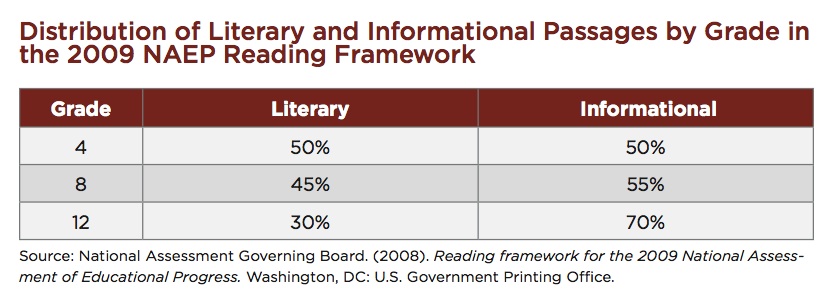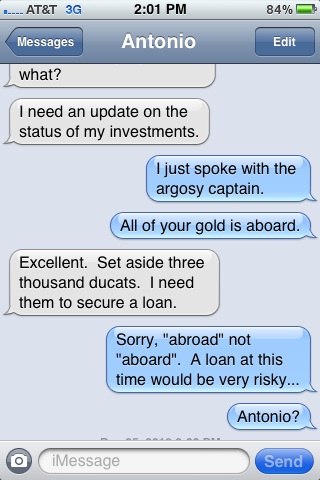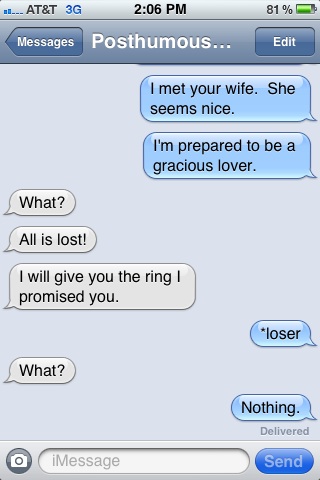Shakespeare Anagram: King Lear
Saturday, January 12th, 2013From King Lear:
No, they cannot touch me for coining; I am the king himself.
Shift around the letters, and it becomes:
Theory of minting that uncommon coin: if he likes change…
From King Lear:
No, they cannot touch me for coining; I am the king himself.
Shift around the letters, and it becomes:
Theory of minting that uncommon coin: if he likes change…
This is the 19th in a series of pop-music parodies for Shakespeare fans.
Enjoy!
I Schemed a Scheme
sung to the tune of “I Dreamed a Dream” from Les Misérables(With congratulations to Best Supporting Actress nominee Anne Hathaway…)
There was a crime here in my mind,
When I’d find these wives,
And I’d come a-wooing.
There was a crime to rob them blind,
And I would earn their trust,
And I’d be their undoing.
There was a crime,
Then it all went wrong.I schemed a scheme so long ago,
When a desperate man could earn a shilling.
I schemed the husbands would not know;
I schemed the wives would be more willing.
I never gave a second thought,
For schemes were gold, success expected.
There was no fear of getting caught,
No trap unsprung, no purse neglected.But they put me in a basket,
And they threw me in the river.
Well, it might have been my casket,
And it turned my scheme to rage.
They would not let me in their lives;
They left me soaking in a shiver.
And I must blame the merry wives
Of Master Ford and Master Page.
And still I scheme they’ll come to me,
And they will open up their purses.
But there are schemes that cannot be,
And there are blessings turned to curses.I had a scheme these wives would be
So different from the way I found them;
So different now from how I schemed.
These wives have killed
The scheme I schemed.
Across the United States, education is undergoing a sea-change (into something rich and strange) surrounding the adoption of something called the Common Core State Standards.
Standards are simply a list of what students should be able to do by the end of each grade. Traditionally, these have been defined by states, with a requirement for them to do so by the No Child Left Behind Act of 2001. States still define their own standards, but, in an unprecedented act of coordination, 45 states (plus the District of Columbia and a few of the territories) have adopted the Common Core as their state standards. Full adoption has been targeted for next year, though New York has started phasing in significant portions of it this year.
Love it or hate it, the Common Core represents a new direction in pedagogical thinking, both qualitatively and quantitatively. Personally, I think the Common Core standards are a lot better than the existing New York State Standards, but we’re going to have to suffer through a difficult transition period before we can reap the benefits of that improvement. Right now is probably the most difficult time, as we have to deal with students who are not starting on what the new structure defines as grade-level, a lack of Common Core-aligned teaching materials, and uncertainty surrounding precisely how these new standards will be assessed. May you live in interesting times.
As with anything new and complex, there are going to be a number of misconceptions floating around about it. One of the most prevalent I’ve seen is that the Common Core eliminates (or at least de-emphasizes) literature, in favor of informational texts. In particular, many are convinced that Shakespeare will be replaced entirely by non-fiction, as public education descends into a Dickensian nightmare of Shakespeare-deprived conformity and standardization.
In fact, Shakespeare is mandated by the Common Core.
The confusion seems to stem from a chart that appears on page 5 of the English Language Arts Standards document, outlining the percentages of literary vs. informational texts included in the National Assessment of Educational Progress:

(Click for a larger image.)
The Common Core is explicit about aligning curricula with this framework, but it is just as explicit about how that alignment should be distributed:
Fulfilling the Standards for 6–12 ELA requires much greater attention to a specific category of informational text—literary nonfiction—than has been traditional. Because the ELA classroom must focus on literature (stories, drama, and poetry) as well as literary nonfiction, a great deal of informational reading in grades 6–12 must take place in other classes if the NAEP assessment framework is to be matched instructionally.
So, despite the canard that high-school English classes will only be allowed to teach literature 30% of the time, the 70% informational text requirement refers to the entirety of student reading across the curriculum. Given that one of the major shifts is an increase in reading and writing in the content areas, the ratio makes sense.
Let’s say that, over the course of a particular unit, a high-school English teacher is assigning 3 literary texts and 1 informational text. That means that (text length aside) students are reading 75% literature in English class. And if this is the only reading the students are doing, then they are reading 75% literature overall. But now imagine that, during the same timeframe, they are also reading 2 informational texts in social studies, 2 informational texts in science, and 2 informational texts in all of their other classes combined. They are still reading 75% literature in English class, but this now represents 30% of their reading overall.
And, far from being lost in the informational-text shuffle, Shakespeare now becomes the man of the hour. As the only author explicitly required by the Common Core, Shakespeare must be taught in grades 11 and 12 (see page 38, right column, Standards 4 and 7). Shakespeare is also included in the recommended texts for grades 9 and 10 (see page 58, left column, center). And Shakespeare is not excluded for younger students either, as the standards outline only the minimum of what must be taught in each grade. The Common Core does stress using authentic texts, so updated language versions of Shakespeare would be frowned upon, but that’s actually an adjustment I can get behind.
There is a lot of controversy surrounding the Common Core, and a lot of objections surrounding the new changes. Some of these objections are legitimate, and some are not. I look forward to continuing that conversation as the implementation develops. But rest assured that Shakespeare isn’t going anywhere.
Happy Twelfth Night!
From Twelfth Night:
Twelfth-Night; or, What You Will
Shift around the letters, and it becomes:
Weighty twin full-throat howl
This is the 18th in a series of pop-music parodies for Shakespeare fans.
Enjoy!
Titania
sung to the tune of “Titanium”(With apologies to David Guetta, Sia, and the fairy Queen…)
You make demands,
But you have here disturbed our sport.
You’re simply requesting too much.
Our argument has caused the seasons to alter.
You want the boy, but I say no.I’m powerful, nothing to prove,
Trip away, trip away.
The fairy Queen, of legend’s fame,
Trip away, trip away.
The enchanted wood is where I rule,
I am Titania!
The enchanted wood is where I rule,
I am Titania!Threaten me,
But it’s you who’ll have to suffer all.
I’ve found a new love.
Voice of gold, mind of steel and head of beast,
He’s braying loud, not saying much.I’m powerful, nothing to prove,
Trip away, trip away.
The fairy Queen, of legend’s fame,
Trip away, trip away.
The enchanted wood is where I rule,
I am Titania!
The enchanted wood is where I rule,
I am Titania!
I am Titania!I am Titania!
My love, is this right?
My eyes now loathe his sight.
Oberon, what have you done?The enchanted wood is where I rule,
I am Titania!
The enchanted wood is where I rule,
I am Titania!
The enchanted wood is where I rule,
I am Titania!I am Titania!
I wanted to address a question that isn’t Frequently Asked, but one that is often raised in more subtle ways: Why would a blog dedicated to the teaching of Shakespeare talk so much about politics? Why risk alienating Shakespeare fans that may not agree with my viewpoints? Wouldn’t it be better to build a community of Shakespeare teachers without venturing into the socially impolite topic of partisan politics?
First of all, allow me to clarify that this blog isn’t entirely dedicated to teaching Shakespeare, as you may have noticed. “Shakespeare Teacher” is simply meant to be my blogger handle. The blog has always been about whatever I happen to find interesting at the moment, which often includes education and Shakespeare, but it also will include politics from time to time. But the question does lead to a more interesting question about how contemporary politics and Shakespeare are related in the roles they play in our lives.
In The Theatre of the Oppressed, Augusto Boal tells us that “all theater is necessarily political, because all the activities of man are political and theater is one of them.” What’s the point of studying Shakespeare if we’re not going to learn from him? And what’s the point of learning from him if we’re not going to apply what we’ve learned to build a better world? People who study that other great work of literature never hesitate to cite passages from it to imply an endorsement of their political views. We should not be timid to bring Shakespeare into the discussion when his insights would add a vital perspective.
I sometimes try to do this with the anagram, and this example from King Lear is perhaps illustrative. Lear is looking at the helpless victims of a storm and recognizing that he is partly responsible for their plight. “O! I have ta’en/ Too little care of this.” And if we can be moved by his words, it’s only fair to ask: moved to what? If we can be moved to tears, we can be moved to action. Because what moves us in that line is our recognition of the things in the world that we ourselves have ta’en too little care of. Like, for example, the helpless victims of a storm, and our responsibility to them.
We venerate Shakespeare for his wisdom about the human condition. Some go so far as to say that he teaches us what it means to be human. But how does this understanding manifest itself in our society if not in the decisions we make as public policy? How do we define ourselves? How do we treat each other? How can we meet our most fundamental human needs? How do we deal with the unexpected? What are our priorities? What is our responsibility to one another? How we answer these questions for ourselves determines how we make the big decisions about the kind of society we want to be and the kind of world we want to live in. These decisions are swayed by policy, policy is swayed by elections, and elections are swayed by public opinion. Can Shakespeare be a voice in that discussion?
I talk about Shakespeare. I talk about politics. I welcome you to the conversation.
As the year is winding down, I’m looking back over the last twelve months of Shakespeare Teacher to prepare for the annual Top Ten Posts list, which will be up tomorrow. I admit that this has not been my most prolific year, but I’ve been extremely busy. Busyness is often cited as a complaint, but I have no complaints. Rather, my busyness has been the result of having too many opportunities that were too good to pass up. Why then, can one desire too much of a good thing?
One of the things that has been occupying my time has been a new graduate-level course I’m teaching for NYU on evaluation for school administrators. I didn’t know I’d be teaching it until the course actually started, so I’ve been burning the candle at both ends trying to stay prepared each week. The effort has been worthwhile, as the students have been giving glowing feedback to the department, and I’ve been hired to teach it again in the spring. I’ll also be teaching my regular course for English teachers on using drama as a teaching tool, so I should still be pretty busy… the good busy, but busy nevertheless.
Still, I’d like to be using the blog to write about the things that I’m doing and to process what I’m learning while I’m doing them. I haven’t been doing that, and my New Year’s Resolution is to return to doing that. So busyness isn’t an excuse to avoid writing; it should be a call to write. Readers have continued to enjoy the regular features, and I’ve enjoyed writing them, but they were never what this blog was supposed to be about. I recently had one experience in particular that I’ve regretted not taking the time to share with the readers of this website, so I’d like to do so now. Better late than never.
Thirteen (WNET) has produced a series called Shakespeare Uncovered which will premiere on PBS stations on January 25. I had nothing to do with the creation of the series, but Thirteen asked me to sit on an advisory board to consult on the educational outreach component that accompanies their programming. So far, this has consisted of previewing the series and having a day-long meeting with Thirteen educators and other members of the advisory board.
I was excited enough to work with Thirteen and on teaching Shakespeare no less, but when I found out who the other members of the board were going to be, I was floored. These are my teaching Shakespeare heroes, some of whom I’ve met through my dealings with the Folger, others of whom I know by reputation. My claim to fame, on the other hand, is that I snatched a good Internet domain name when the snatching was good. But I think my enthusiasm for the subject matter made up the difference. Having the chance to spend an entire day discussing the teaching of Shakespeare with a team of experts was like being invited to eat ambrosia on the top of Mount Olympus. And I’ve been yearning to tell you about it ever since.
By the way, the Shakespeare Uncovered series is amazing, and you should watch it when it airs. If you’re into Shakespeare, you’ll appreciate all of the different angles the series covers. And if you’re not a Shakespeare fan, you may come to understand why some of us are.
I had hoped that this post wouldn’t come off as too self-critical or apologetic. But now that I read over it, it comes off as one big humblebrag. I can live with that. The Top Ten list will be posted tomorrow.
From King Lear:
Give me your hand: you are now within a foot
Of the extreme verge: for all beneath the moon
Would I not leap upright.
Shift around the letters, and it becomes:
I hope they find enough wiggle room to woo home a tax rate deal before they unroll that punitive maneuver. *Frown*
This is the 17th in a series of pop-music parodies for Shakespeare fans.
Enjoy!
Lady, It’s Warm Outside
sung to the tune of “Baby, It’s Cold Outside”(With apologies to Cee-Lo Green, Christina Aguilera, and the many artists who have performed this seasonal classic duet…)
You venomous toad
Lady, it’s warm outside
Hey, just hit the road
Metaphorically warm outside
I’ve been left to lament
The winter of discontent
And I’m concerned
To glorious summer has turned
You’re a pitiless beast
Beautiful, that’s something at least
Give me leave to curse thyself
I feel even worse myself
And now I accuse thyself
Beautiful, I can’t excuse myself
May lightning strike you dead
These compliments will go to my head
My husband has died
Lady, not by my hand
But your regicide
That was not what I planned
You should be locked in a fetter
I know one place better
As I have said
It is beside you in your bed
I ought to say no, no, no, sir
Mind if I move in closer
Cursed be your future wife
Lady, I want it to be you in my life
I really can’t stay
Now, Lady, don’t storm out
‘Cause it’s warm outside
Now this king is dead
Your beauty gave me pause
And you killed my Ed
Your beauty was the cause
If I thought that
It really knocks me flat
My nails would rend
Don’t even start to pretend
My sister will disown me
Lady, have you ever really known me
My father will spin in his grave
In life, he was far more brave
It will dishonor my husband’s life
A better husband for his wife
I really don’t know what to say
You’ve nowhere else to go anyway
You deserve your reward
Lady, if you think it best
Say, lend me your sword
Drive it right through my chest
It’s not in me to kill
Say the word and I will
I have already said
In your rage, but now you have a clearer head
I wish I knew your heart
I will inter this king
You lied to me right from the start
Vouchsafe to wear this ring
I’m glad you have repented
I’m glad you have relented
‘Cause it’s warm outside




